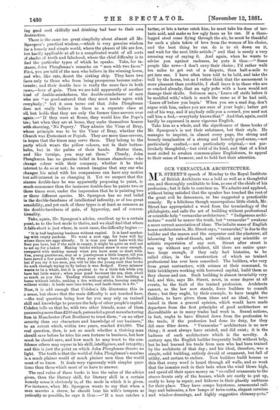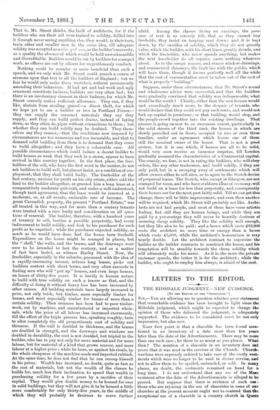OUR VERNACULAR ARCHITECTURE.
MR. STREET'S speech of Monday to the Royal Institute of British Architects was a bold as well as a thoughtful one, and thoroughly creditable to him, as one of the chiefs of his profession ; but it fails to convince us. We admire and applaud, without being satisfied that the speaker has touched the root of the great evil he denounces, or has suggested a practicable remedy. By a felicitous though unscrupulous little clutch, Mr. Street has appropriated. a word from the terminology of the philologists, and calls the art of building without professional or scientific help "vernacular architecture." "Indigenous archi- tecture" would be nearer the truth, but "vernacular" awakens a more correct association of ideas. The infinite mass of English house architecture is, Mr. Street says, "vernacular," is due to the builder and the mason and the carpenter and the plasterer, all labouring by rule-of-thumb, and without any scientific or artistic supervision of any sort. Street after street is run up without any architect, till there are entire guar- Mrs large enough, if they only had histories, to be called cities, in the construction of which no trained professional has ever been consulted. The builders, who vary from great contractors, with science at their command, to little bricklayers working with borrowed capital, build them as they choose and can. Such building is almost invariably very bad, and this, says Mr. Street, must, in some degree at all events, be the fault of the trained profession. Architects cannot, as the law now stands, force builders to consult them ; but they ought, by their example, to have taught the builders, to have given them ideas and an ideal, to have raised in them a general opinion, which would have made departure from the first principles of good architecture as discreditable as in many trades bad work is. Sound notions, in fact, ought to have filtered down from the profession to the trade, if the profession had done its duty, for they did once filter down. " Vernacular " architecture is no new thing ; it must always have existed, and did exist ; it is the badness of such architecture which is the novelty. A century ago, the English builder frequently built without help, but he had learned his trade from men who had been trained by the architects of that day ; and his ideal, therefore, was a simple, solid building, entirely devoid of ornament, but full of utility, and certain to endure. Now builders build houses so thin that every word is heard through all walls, and so weak that the inmates rock in their beds when the wind blows high, and spend all their spare money on "so-called ornaments to the stucco fronts only of the houses, which are costly to put up, costly to keep in repair, and hideous in their ghastly unfitness for their place. They have compo keystones, ornamental rail- ings and balconies, a few lamps of terra-cotta, elegant cornices and. window-dressings, and highly suggestive chimney-pots." That is, Mr. Street thinks, the fault of architects, for if the builders who use their aid were trained to solidity, drilled into it through never seeing anything else, they would, in their turn, train other and smaller men in the same idea, till adequate solidity was accepted as a sine qua non, as the builder's necessity, as a quality the absence of which would be held unworkmanlike and discreditable. Builders would be cut by builders for scam pod work, as officers are cut by officers for ungentlemanly conduct.
Nothing could be sounder or more beneficial than such a speech, and we only wish Mr. Street could preach a course of sermons upon that text to all the builders of England ; but we fear he would only make them wretched, without permanently amending their behaviour. If bad art and bad work and ugly ornament constitute badness, builders are very often bad ; but there is an involuntary element in their badness, for which Mr. Street scarcely makes sufficient allowance. They can, if they like, abstain from stealing gravel—a direct theft, for which we hope yet to see a builder or two in Portland Prison— they can supply the seasoned materials they say they supply, and they can build perfect drains, instead of laying down, as they often do, pipes without connections to them ; but whether they can build solidly may be doubted. They them- selves say they cannot,—that the conditions now imposed by circumstances are too numerous and too inexorable, and that to demand solid building from them is to demand that they cease to build altogether ; and they have a colourable case. All possible circumstances which could induce a decent builder to build houses so weak that they rock in a storm, appear to have arrived in this country together. Iu the first place, the free- holders of the soil, who have the first word in the matter, do not ask builders to build well, but almost insist, as a condition of em- ployment, that they shall build badly. The freeholder of the last century, anxious for profit on his city estate, either sold the land to the builder altogether, or granted him a long lease at a comparatively moderate quit-rent, and under a well-understood, though tacit agreement, that the lease would be renewed at a moderate, or, at all events, endurable rate of increase. The great Cavendish property, the present "Portland Estate," was all treated in this way, and for more than a century tenants were treated with a rare lenity and consideration on all ques- tions of renewal. The builder, therefore, with a hundred years of tenancy to sell, besides a possible perpetuity, had every inducemeut to build solidly, and look to his purchaser for such profit as he expected ; while the purchaser expected solidity, as much as he would have done had the house been freehold. Expenditure on the house might be scamped in places, but the "shell," the walls, and the beams, and the doorways were sure to be intended to last the century, and as a matter of fact have lasted, as witness Harley Street. Now, the
• freeholder, especially in the suburbs, possessed with the idea of a rapidly-increasing income, refuses long leases, picks out builders content with short terms, and very often succeeds in finding men who will "put up" houses, and even large houses, on leases of thirty-five years. It is hardly in human nature to build with true solidity on such a tenure as that, and the difficulty of doing it without heavy loss has been increased by other causes. All building materials have largely increased in price, not only brick, but timber, more especially timber for beams, and most especially timber for beams of more than a certain solidity. Then recourse has been had to poor timber- work, cut by machine, and manufactured or imported whole- sale, while the price of all labour has increased enormously, till the effect of the triple process has, speaking roughly, been to alter completely the old proportionate cost of solidity and thinness. If the wall is doubled in thickness, and the beams are doubled in strength, and the doorways and windows are doubled in durability, the cost is not doubled, bat tripled to the builder, who has to pay not only for more material and for more labour, but for material of a kind that grows scarcer, and more labour at a higher price ; while he loses, as against his rivals, by the whole cheapness of the machine-made and imported rubbish. At the same time, he does not find that he can recoup himself in his prices. Wealth has increased, no doubt, quite as fast as the cost of materials, but not the wealth of the classes he builds for, much less their inclination to spend that wealth in purchasing solidity for a few years by a sacrifice of their capital. They would give double money to be housed for ever in solid buildings, but they will not give it to be housed a little more comfortably for only thirty-five years, in the middle of which they will probably be desirous to move further
afield. Among the classes living on earnings, the pres- sure of rent is so severely felt, that as they cannot buy freeholds, they insist on keeping rent down ; and it is kept down, by the sacrifice of solidity, which they do not greatly value, which the builder, with his short lease, greatly dreads, and which the freeholder, who never spends anything, but makes the next leaseholder do all repairs, cares nothing whatever about. As to the compo messes, and stucco window-dressings, and ornamented chimneys, the fault lies with the public, which will have them, though it knows perfectly well all the while that the cost of ornamentation must be taken out of the cost of what is properly "building."
Suppose, under these circumstances, that Mr. Street's sound and wholesome advice were successful, and that the builders were gradually convinced that solidity was indispensable, what would be the result ? Clearly, either that the new houses would cost exceedingly much more, to the despair of tenants, who would declare that they could not pay such rents, and would not lock up capital in premiums; or that building would stop, and the people crowd together into the existing dwellings. That process is going on now to an enormous extent, particularly in the solid streets of the third rank, the houses in which are slowly parcelled out in floors, occupied by two or even three families, under an agreement which leaves one of them still the nominal owner of the house. That is not a good system, but it is one which, if houses are all to be solid, would very soon receive an immense impetus, till London gradually assumed the characteristics of a Continental capital. The remedy, we fear, is not in rating the builders, who will obey orders, like any other tradesmen, and build solidly, if they are only paid, but in a sweeping away of settlements which will allow owners either to sell sites, or to agree to the Scotch devise of perpetual leases. The Scotch, who, except in Glasgow, are not cramped for room, and who have stubborn ideas of economy, will not build on a lease for less than perpetuity, and consequently their houses are for the most part fairly solid. Till we can get this change, there will be little improvement, and even then another will be required, which Mr. Street will probably not like. Archi- tects are not bad people, and most of them have some artistic feeling, but still they are human beings, and while they are paid by a per-centage they will never be heartily desirous of securing cheap solidity. They like the solidity well enough, but they like also to be paid ; and a. house which costs 210,000 costs the architect no more time or energy than a house which costs £5,000, while the architect's honorarium is very nearly double. Let the architect contract to supervise the 'builder as the builder contracts to construct the house, and his temptation will be steadily towards the cheap solidity which will ultimately make his name. As it is, the more the private customer spends, the better it is for the architect ; while the builder, who ought to employ him always, is afraid of the cost.



































 Previous page
Previous page